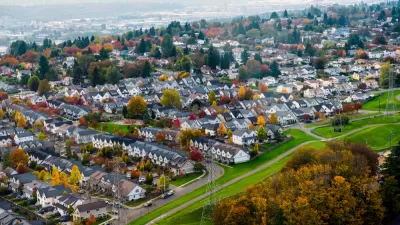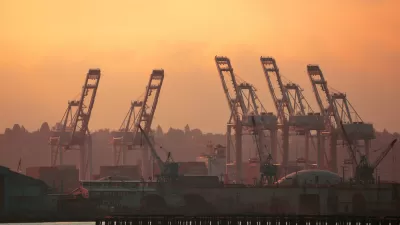After a recent state ruling requiring Seattle and other Puget Sound cities to control polluted stormwater runoff, smaller cities and suburbs could be brought on board as well.
"A key concept is whether the government should require, or merely permit, "low-impact" development techniques to control stormwater, which is considered the biggest source of many of Puget Sound's worst pollutants."
"The smaller cities -- from Aberdeen to Yarrow Point, including Bellevue, Redmond, Edmonds, Everett and Federal Way -- merely have to take steps toward requiring the enviro-friendly construction methods."
"Steps to minimize the polluted runoff focus on minimizing concrete and other hard surfaces that cause rain to flow away, carrying pollutants such as oil and copper residue from cars' brakes. Examples include vegetated roofs, special pavement that allows water to soak through, and "rain gardens" that slurp up runoff."
"The environmentalists were stopped short in their effort to convince the quasi-judicial hearings board that the 85 smaller cities and counties should have to take the same steps as Seattle, Tacoma and the counties of King, Pierce, Snohomish and Clark."
FULL STORY: Stormwater isn't just a big-city problem

Trump Administration Could Effectively End Housing Voucher Program
Federal officials are eyeing major cuts to the Section 8 program that helps millions of low-income households pay rent.

Planetizen Federal Action Tracker
A weekly monitor of how Trump’s orders and actions are impacting planners and planning in America.

Ken Jennings Launches Transit Web Series
The Jeopardy champ wants you to ride public transit.

How Project Connect Would Change ‘The Drag’
A popular — and sometimes deadly — Austin road will exchange car lanes for light rail.

Milwaukee Road to Get Complete Streets Upgrades
The city will reduce vehicle lanes and build a protected multi-use trail including bioswales and other water retention features on its ‘secret highway.’

Tackling Soil Contamination With Nature-Based Solutions
Los Angeles County residents and experts are turning to nature-based methods like bioremediation to address long-standing and fire-exacerbated soil contamination without resorting to costly and disruptive removal.
Urban Design for Planners 1: Software Tools
This six-course series explores essential urban design concepts using open source software and equips planners with the tools they need to participate fully in the urban design process.
Planning for Universal Design
Learn the tools for implementing Universal Design in planning regulations.
Ada County Highway District
Clanton & Associates, Inc.
Jessamine County Fiscal Court
Institute for Housing and Urban Development Studies (IHS)
City of Grandview
Harvard GSD Executive Education
Toledo-Lucas County Plan Commissions
Salt Lake City
NYU Wagner Graduate School of Public Service




























